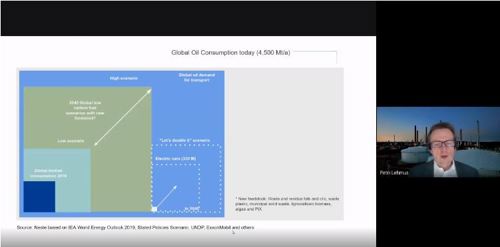2021 IRPC Process: Day 2 Keynote Address—Transforming refineries to minimize carbon footprint and maximize handprint
During Thursday morning’s opening Keynote Address of Hydrocarbon Processing’s IRPC Process virtual event, Petri Lehmus, Vice President of Research & Development for Neste Corp., began his discussion by examining the Paris Agreement, which he stated requires all of us “to act now, act fast, and half all emissions every 10 years.”

“At Neste,” Dr. Lehmus said, “we have set ourselves the carbon neutrality production target of 2035, so we will certainly want to contribute to this development.” He turned to the global oil demand outlook, which would need to be cut by 50% to achieve these climate goals. This would, of course, require substitutions and alternatives. Of the global oil consumption today—approximately 4,500 MMtpy—some 66% is for the transport sector. Even with significant growth in the electric vehicle sector, an increase in biofuel consumption is needed. “Low-carbon liquid fuels are truly scalable and a system level solution,” he said, “in addition to electrification.”
“It is sometimes a bit puzzling to hear people talking about abolishing the use of internal combustion engines. To me, that sounds like closing the door to a great part of the overall solution. Liquid, synthetic, low-carbon fuels are a great drop-in solution for combustion engines,” Dr. Lehmus said. “The fuels that should be used are sustainable, low-carbon fuels that help to curb CO2 emissions in the long run.”
He continued to discuss the importance of countries and companies making what he called a “climate commitment.” For example, Neste is committed to reducing its customers’ greenhouse gas emissions with its renewable and circular solutions by at least 20 MMtpy of CO2 by 2030. He also discussed various ways to accomplish these goals, such as carbon capture and refinery transformation.
To watch the entire presentation on-demand and join more than 1,500 industry professionals at IRPC Process, login HERE






Comments